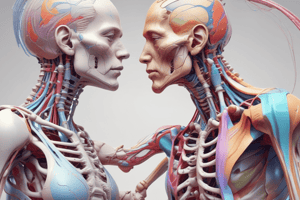Podcast
Questions and Answers
Once this correlation has been clearly established and ______, there will be a much clearer picture.
Once this correlation has been clearly established and ______, there will be a much clearer picture.
quantified
There is a possibility of anticipating undesired occurrences such as buccolingual and ______ tipping.
There is a possibility of anticipating undesired occurrences such as buccolingual and ______ tipping.
mesiodistal
In a specific clinical situation, a better alternative would be with attachment location ______.
In a specific clinical situation, a better alternative would be with attachment location ______.
modification
A strong mesial tipping moment and a weak mesiolingual ______ moment.
A strong mesial tipping moment and a weak mesiolingual ______ moment.
Signup and view all the answers
The typical force couple generated during bracket-based alignment consists of two force ______.
The typical force couple generated during bracket-based alignment consists of two force ______.
Signup and view all the answers
Due to the distance between the center of resistance and the line of ______, large mesial tipping should be expected.
Due to the distance between the center of resistance and the line of ______, large mesial tipping should be expected.
Signup and view all the answers
The resultant force affecting the first premolar will produce ______ and clockwise, second-order rotation.
The resultant force affecting the first premolar will produce ______ and clockwise, second-order rotation.
Signup and view all the answers
Active surfaces of attachments contribute to the ______ of forces acting on them.
Active surfaces of attachments contribute to the ______ of forces acting on them.
Signup and view all the answers
Studies of the upper airway based on ______ scans are considered to be reliable in defining the border between soft tissues and void spaces.
Studies of the upper airway based on ______ scans are considered to be reliable in defining the border between soft tissues and void spaces.
Signup and view all the answers
The conclusion was that pretreatment orthodontic ______ imaging can assist clinicians in selecting preventive or interceptive periodontal treatment.
The conclusion was that pretreatment orthodontic ______ imaging can assist clinicians in selecting preventive or interceptive periodontal treatment.
Signup and view all the answers
Limited, poor quality, and low evidence level literature is available on the effect of head posture and ______ position on upper airway dimensions.
Limited, poor quality, and low evidence level literature is available on the effect of head posture and ______ position on upper airway dimensions.
Signup and view all the answers
Natural head position at CBCT acquisition is the suggested standardized ______.
Natural head position at CBCT acquisition is the suggested standardized ______.
Signup and view all the answers
Indications and methods related to tongue position and ______ during data acquisition are still lacking.
Indications and methods related to tongue position and ______ during data acquisition are still lacking.
Signup and view all the answers
The accurate acquisition of the face appearance character-istics is important to plan ______ surgery.
The accurate acquisition of the face appearance character-istics is important to plan ______ surgery.
Signup and view all the answers
Excellent work is based on an exact ______ modeling.
Excellent work is based on an exact ______ modeling.
Signup and view all the answers
The oropharyngeal airway volume was found to have generalized ______ intra-examiner and inter-examiner reliability.
The oropharyngeal airway volume was found to have generalized ______ intra-examiner and inter-examiner reliability.
Signup and view all the answers
In orthognathic surgery, digital imaging and ______ data can be used to fabricate physical models.
In orthognathic surgery, digital imaging and ______ data can be used to fabricate physical models.
Signup and view all the answers
The reconstruction method based on CT technology is sensitive to the ______.
The reconstruction method based on CT technology is sensitive to the ______.
Signup and view all the answers
Cone-beam computed tomography is used for orthodontic ______.
Cone-beam computed tomography is used for orthodontic ______.
Signup and view all the answers
The active optical sensing technique is one of the methods used for ______ data extraction.
The active optical sensing technique is one of the methods used for ______ data extraction.
Signup and view all the answers
Several software programs are available to create virtual ______ for orthodontic purposes.
Several software programs are available to create virtual ______ for orthodontic purposes.
Signup and view all the answers
The image for orthodontic purposes should be recorded with the patient's eyes ______.
The image for orthodontic purposes should be recorded with the patient's eyes ______.
Signup and view all the answers
Thermoforming plastic foils are used to create ______.
Thermoforming plastic foils are used to create ______.
Signup and view all the answers
The smiling image will permit the use of dental ______ to superimpose digital models.
The smiling image will permit the use of dental ______ to superimpose digital models.
Signup and view all the answers
In orthodontics, the role of ______ planning is becoming more significant.
In orthodontics, the role of ______ planning is becoming more significant.
Signup and view all the answers
The systematic review focuses on transversal dental arch dimensions in ______ surgery.
The systematic review focuses on transversal dental arch dimensions in ______ surgery.
Signup and view all the answers
The use of ______ tomography has become a standard practice in contemporary orthodontics.
The use of ______ tomography has become a standard practice in contemporary orthodontics.
Signup and view all the answers
The American Dental Association emphasizes the importance of ______ assessment in orthodontics.
The American Dental Association emphasizes the importance of ______ assessment in orthodontics.
Signup and view all the answers
Interdisciplinary ______ therapy can enhance treatment outcomes in orthodontics.
Interdisciplinary ______ therapy can enhance treatment outcomes in orthodontics.
Signup and view all the answers
An advisory statement was issued by the American Dental Association on the use of ______ in dentistry.
An advisory statement was issued by the American Dental Association on the use of ______ in dentistry.
Signup and view all the answers
Real-time correlation-based stereo vision aims to reduce ______ errors in imaging.
Real-time correlation-based stereo vision aims to reduce ______ errors in imaging.
Signup and view all the answers
The recommendations of the International ______ Commission focus on radiological protection.
The recommendations of the International ______ Commission focus on radiological protection.
Signup and view all the answers
A treatment planning system based on computed ______ data has been developed for orthodontics.
A treatment planning system based on computed ______ data has been developed for orthodontics.
Signup and view all the answers
The American Dental Association conducted a review focusing on ______ changes influenced by tooth movement.
The American Dental Association conducted a review focusing on ______ changes influenced by tooth movement.
Signup and view all the answers
The lack of coincidence between the attachment and its corresponding ______ in the aligner is unambiguous evidence of loss of tracking.
The lack of coincidence between the attachment and its corresponding ______ in the aligner is unambiguous evidence of loss of tracking.
Signup and view all the answers
The evolution of attachments has resulted in a diverse array of configurations with well-defined ______ objectives.
The evolution of attachments has resulted in a diverse array of configurations with well-defined ______ objectives.
Signup and view all the answers
Vertical control is particularly important in open-bite patients with increased anterior facial ______.
Vertical control is particularly important in open-bite patients with increased anterior facial ______.
Signup and view all the answers
Clinically, a properly designed attachment can produce complementary ______ vectors required for predictable tooth movement.
Clinically, a properly designed attachment can produce complementary ______ vectors required for predictable tooth movement.
Signup and view all the answers
Updated digital dental models may be required when there is a loss of ______ during the treatment.
Updated digital dental models may be required when there is a loss of ______ during the treatment.
Signup and view all the answers
The tendency of conventional fixed orthodontics is to increase vertical ______.
The tendency of conventional fixed orthodontics is to increase vertical ______.
Signup and view all the answers
Aligner-based treatment has been proven to be an effective alternative for open-bite ______.
Aligner-based treatment has been proven to be an effective alternative for open-bite ______.
Signup and view all the answers
A strong mesial tipping moment must be managed to prevent undesired ______ in orthodontic treatment.
A strong mesial tipping moment must be managed to prevent undesired ______ in orthodontic treatment.
Signup and view all the answers
Study Notes
Understanding Force Couples in Aligner Orthodontics
- The placement of attachments on teeth can significantly influence the direction and magnitude of forces applied during aligner therapy.
- A force couple, consisting of two opposing forces, is generated when an aligner engages with an attachment.
- The location of an attachment on a tooth determines the specific rotational moments that are generated.
- For example, placing an attachment mesially on a tooth will generate a mesial tipping moment, while placing it distally will generate a distal tipping moment.
- In cases where mesiolingual rotation is desired, careful positioning of the attachment to minimize the tipping moment and maximize the rotational moment is key.
The Use of CBCT in Orthodontics and Periodontics
- 3D imaging through Cone Beam Computed Tomography (CBCT) offers valuable insights for assessing airway dimensions, morphology, and the relationship between teeth and jaw bones.
- CBCT allows for the visualization of soft tissues, important for evaluating the upper airway (e.g., size and volume of pharynx).
- CBCT imaging can be helpful in identifying and quantifying bone changes associated with orthodontic tooth movement, guiding preventive or surgical interventions.
- CBCT can be used to aid in the planning of orthognathic surgery by providing detailed anatomical information.
CBCT in Orthodontics and Facial Reconstructions
- Using CBCT data allows for the creation of virtual 3D models for simulating and planning outcomes of facial surgery.
- CBCT data paired with specialized software can assess the impact of orthodontic treatment and predict the need for further interdisciplinary intervention.
- 3D facial reconstructions are crucial for accurate planning of orthognathic surgery, improving outcomes.
Aligner Setup and Considerations for Treatment Planning
- Different software programs exist for creating virtual aligner setups guiding thermoplastic aligner production.
- These programs incorporate digital models to predict tooth movement and create a treatment sequence using a series of aligners.
- The design and biomechanics of attachments are crucial for achieving predictable tooth movement.
- Optimizing attachment design for specific biomechanical objectives is crucial for successful aligner-based treatment.
Vertical Control in Aligner Orthodontics
- Aligners have proven to be effective for treating open bites and improving vertical dimensions in patients with excessive anterior facial height.
- Properly designed attachments generate complementary force vectors to achieve controlled tooth movement.
- Inconsistent engagement between attachments and aligners, leading to loss of tracking, can hinder desired tooth movement and necessitate re-planning.
Attachment Diversity and Biomechanical Objectives
- Attachments have evolved significantly, integrating different shapes and locations to achieve targeted biomechanical objectives.
- The goal is to create predictable and controlled tooth movement through the precise application of forces using attachments.
Studying That Suits You
Use AI to generate personalized quizzes and flashcards to suit your learning preferences.
Related Documents
Description
This quiz explores the critical role of force couples in aligner orthodontics. It covers how the placement of attachments affects the direction and magnitude of forces during therapy. Additionally, it highlights the importance of strategic attachment positioning for desired tooth movements.




